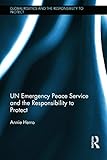UN Emergency Peace Service and the responsibility to protect / Annie Herro.
Series: Global politics and the responsibility to protectPublisher: New York, NY : Routledge, 2015Copyright date: ©2015Description: xi, 168 pages ; 24 cmContent type:- text
- unmediated
- volume
- 9780415719193
| Item type | Current library | Home library | Collection | Call number | Materials specified | Copy number | Status | Date due | Barcode | |
|---|---|---|---|---|---|---|---|---|---|---|
| AM | PERPUSTAKAAN TUN SERI LANANG | PERPUSTAKAAN TUN SERI LANANG KOLEKSI AM-P. TUN SERI LANANG (ARAS 5) | - | JZ6374.H475 (Browse shelf(Opens below)) | 1 | Checked out | 08/12/2025 | 00002195268 |
Includes bibliographical references (p. 157-161) and index.
'This book examines the attitudes of political, military and non-state actors towards the idea of a UN Emergency Peace Service, and the issues that might affect support of the establishment of this service in both theory and practice. The United Nations Emergency Peace Service (UNEPS) is a civil society-led idea to establish a permanent UN peacekeeping service to improve UN peace operations as well as to operationalise the emerging norm of the'responsibility to protect' civilians from atrocity crimes. The UNEPS proposal has received limited support. The author argues that interest in, and support for, the UNEPS proposal is determined by government perceptions that such a service would erode state sovereignty, the extent to which the principles of the proposal are consistent with actors' views on the world and perceptions on whether UNEPS will realistically be capable of contributing to the workings of the UN and regional peacekeeping systems in areas that are seen to be deficient. The book makes a case for localising the UNEPS proposal and the author suggests that UNEPS' architects might consider developing a less ambitious proposal as a first step to creating a rapidly deployable service with the mandate to prevent atrocity crimes. It examines various alternatives towards this end and concludes that, because the UNEPS proposal is intricately linked to the UN, trust in the world organisation is an essential ingredient in generating support for the idea. It argues that a central way of achieving this is to ensure that the values and priorities of a wide range of stakeholders are seen to be represented in the organisation's structure and workings'-- Provided by publisher.
There are no comments on this title.

